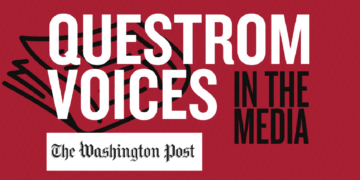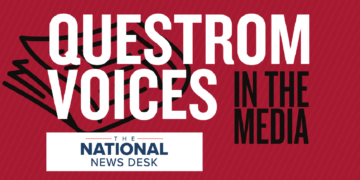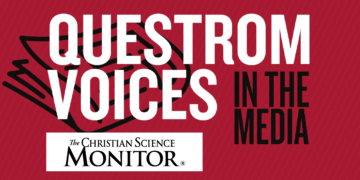Capitalism, communism and socialism are the world’s three major economic systems. While the phrase “economic system” may seem like a yawn, countless people have fought and died in major wars over which one should dominate.
Shifts from one system to another, like the 1989 fall of communism in much of Eastern Europe, changed the lives of millions. And while researchers know that a country’s economic system dramatically impacts people’s living standards, less is known about how attitudes toward these systems have changed over time.
We are professors working at Boston University’s new Ravi K. Mehrotra Institute, which is trying to understand how business, markets and society interact. Given many recent criticisms of capitalism, we were surprised to find positive sentiment toward capitalism is slowly rising over time.
The main economic systems explained
Capitalism, communism and socialism are economic and political systems that differ in their principles and organization. Capitalism emphasizes the private ownership of resources and the means of production, driven by profit and market competition, with minimal government intervention.
Communism, on the other hand, advocates for a classless society where all property is communally owned. In communism, wealth is distributed according to need and there is no private ownership, which aims to eliminate inequality and oppression.
Socialism falls between these extremes. It focuses on the collective or state ownership of key industries and resources. This allows for some private enterprise, with the aim of reducing inequality through social welfare programs and obtaining a more equitable distribution of wealth.
Modern economies blend capitalism with socialism to address challenges like inequality, market failures and negative externalities, like when a business harms the environment. Governments intervene through regulations, welfare programs and public services to tackle issues like pollution and income inequality. This creates what economists call a “mixed economy.”
The amount of state involvement varies from country to country. At one end is market capitalism, where markets dominate with a limited government role. The U.S. is one such example.
At the other end is state capitalism, like in China, where the government directs economic activity while incorporating market elements. The goal is to combine market efficiency and innovation with measures to contain capitalism’s social and economic costs.
How to measure people’s attitudes toward economic systems
Some surveys have asked people directly how they feel about these systems.
For example, the Pew Research organization’s most recent survey on the issue found the proportion of Americans with positive views of either capitalism or socialism has declined slightly since 2019, with capitalism remaining more popular overall. Nevertheless, Americans are split sharply along partisan lines. About three-quarters of Republican voters have positive views of capitalism, compared with less than half of Democratic voters.
Unfortunately, there are no long-running surveys tracking people’s feelings toward the three systems. Because of this shortcoming, we used artificial intelligence to analyze references to the three systems in more than 400,000 newspaper articles published over a span of decades.
We identified every news story that discussed capitalism, communism or socialism using ProQuest’s TDM Studio. ProQuest has digitized almost all the articles in major English-language newspapers – including The Wall Street Journal and The New York Times – starting in the mid-1970s, with partial archives from earlier years.
The AI model was designed to assess the tone of each article across several dimensions, including anger, surprise and happiness. After the model scored each article on those qualities, we combined the emotions into three categories: positive, negative, and neutral or unknown. For example, an article discussing capitalism might be rated as 60% positive, 20% negative and 20% neutral.
Using an AI large language model allowed us to track shifts in press attitudes over time – which, to be fair, might not match popular opinion.
How views have changed since the 1940s
When we looked at newspaper articles from the end of World War II to the present, we found something unexpected. In the 1940s, capitalism was not well regarded. The average article containing “capitalism” or “capitalist” got a 43% negative and 25% positive sentiment score. This is surprising, since we looked at newspapers published primarily in countries with capitalist systems.
However, just because capitalism didn’t get a high positive score doesn’t mean that newspaper writers loved communism or socialism. In the 1940s, articles with those words also got relatively high negative scores: 47% on average for articles containing “communism” or “communist,” and a 46% negative rating for “socialism” and “socialist.”
Since that time, however, positive sentiment toward capitalism has improved. In the 2020s, the average article with capitalism got a more balanced 37% negative and 34% positive sentiment score. While capitalism clearly isn’t loved in the press, it’s also not disparaged as much as it was just after World War II.
The news media’s attitudes toward capitalism improved more than attitudes toward socialism or communism over time. In the 1960s, positive attitudes toward all three were roughly the same. Today, however, positive sentiment toward capitalism is 4 or 5 percentage points higher than the other two. The climb wasn’t steady, since the number of favorable articles about capitalism fell during recession years.
Still, some contemporary commentators fret that capitalism is in crisis.
Not long ago, The New York Times – a newspaper located in the world’s financial center – ran an op-ed headlined “How Capitalism Went Off the Rails.” A recent book review in The Wall Street Journal, a newspaper that is a bastion of capitalism, starts, “Our universities teach that we are living the End of Times of ‘late capitalism.’”
But while capitalism clearly isn’t beloved by all, we didn’t find evidence that it’s being overtaken by socialism or communism. Instead, using AI to process the attitudes reflected in thousands of newspaper articles, we found that people – or at least the press – are slowly warming to it.
This article is republished from The Conversation under a Creative Commons license. Read the original article.




















